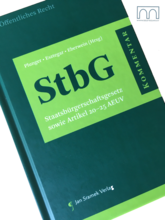Attorney-at-law Balazs Esztegar, an expert in austrian citizenship law, has been one of the first specialist authors to comment on this amendment in the chapter about citizenship law in the WEKA Handbook on Asylum & Immigration Law. In the following he describes the requirements and the procedure:
Citizenship for descendants
The main topic of this amendment is to extend the possibilities to acquire austrian citizenship through declaration. This declaration has been possible for a while for persons who as an Austrian citizen or as a citizen of one of the successor states of the former Austro-Hungarian Monarchy or as stateless person, with principal residence in the territory of the Republic of Austria, left Austria before May 15, 1955, because they had reason to fear or suffered from persecution by organs of the NSDAP and/or the authorities of the Third Reich, or because they were subject to persecution or had to fear such persecution for defending the democratic Republic of Austria.
The new regulation that enters into force on 1st September 2020, this possibility is extended to descendants of such persons.
Requirements for the citizenship through declaration
At this point please note that this specific way of acquisition of Austrian citizenship is in some ways privileged, as the applicant is not required to give up his/her current citizenship. However, it will be necessary to certify that citizenship law of the country the applicant is citizen of right now, would allow him/her to acquire another country’s citizenship without losing the current one.
A person who was citizen of Austria before/during the II. World War, will need to prove this fact as well as the fact that he/she emigrated before 15th May 1955 on the ground of being subject to persecution by organs of the NSDAP or authorities of the Third Reich or having reason to fear such persecution.
Persons who are descandants of such a person will therefore need to prove that
- they ancestor was Austrian citizen at the time he/she left Austria before 15th May 1955,
- the ancestor left Austria because of the prosecution and
- has either reacquired his/her Austrian citizenship or at least could have done so and
- his/her direct relationship to the persecuted ancestor.
The competent authority for persons not born or not residing in Austria is the "Wiener Landesregierung" (Vienna Provincial Government), specifically “Magistratsabteilung/MA 35” (Municipal Department 35). The procedure starts by filing a declaration ("Anzeige"). This declaration can also be filed through the local embassy of Austria in the applicant's home country.
All direct descendants of a persecuted ancestor, i.e. children, grandchildren, great-grandchildren etc. are eligible. Children who were adopted as minors are also regarded as direct descendants.
The duration of the process depends on a number of factors (specific circumstances of the personal situation or the completeness of the submitted documents).
Necessary documents
Since each case is connected to individual circumstances, there is no general answer on which documents have to be submitted. In general, any document or certificate which appears relevant to prove the above mentioned facts could be of importance for the authorities in the proceedings. The law itself speaks of "unobjectionable documents of any other equal evidence"
The decision is made by the competent provincial government in Austria after receiving the declaration and all documents regarding the descendant in original. If the descendent is no longer in possession of the original documents, it is also possible to submit existing copies. The requested documents that are not in German or English must be submitted with a German translation by a judicially certified translator. Foreign documents can require either a diplomatic authentication or an apostille.
Since it is expected that in many cases the procedure to dertermine the former citizenship and/or the personal circumstances of the applicant or his/her descandents will turn out complicated, the Austrian citizenship authority may request assistance from the National Fund of the Republic of Austria (Nationalfonds der Republik Österreich) that will take part in the proceeding as an expert.
Attorney-at-law for citizenship issues
Balazs Esztegar is an attorney-at-law in Vienna, who is specialized on Austrian Citizenship Law. He offers consultation and assistance also in connection with the amendment of § 58c of the Citizenship Act for descendants.





